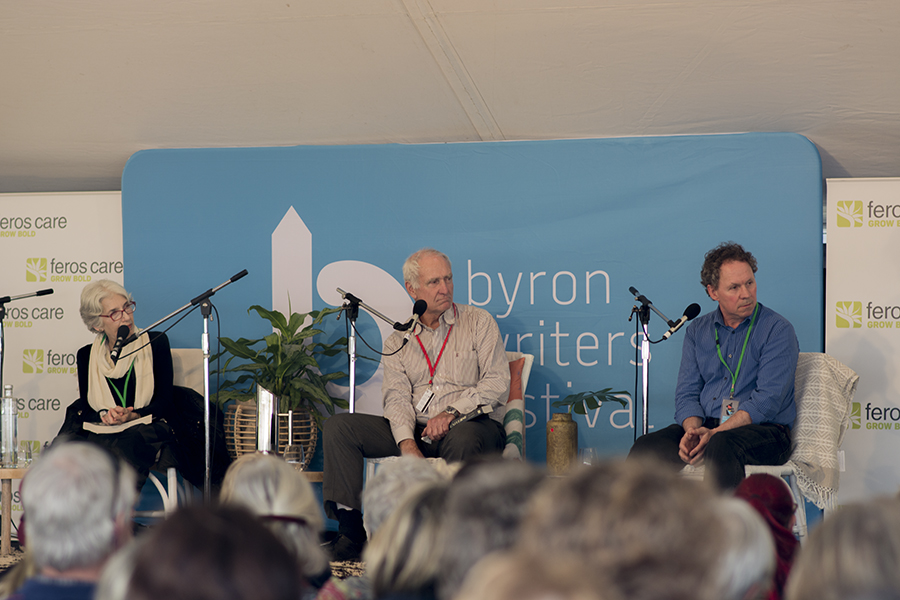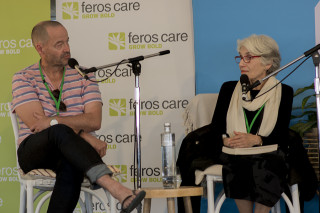Science and philosophy work best when they work together

When a panel of science and philosophy superstars come together to chew over a few ‘what is the nature of…?’ questions, expect to be drawn into their geekdom.
Especially when those superstars include ABC science guru Robyn Williams, philosophy professor Emrys Westacott, and science novelist Dava Sobel. Session chair Adam Spencer asked early on if philosophy was a science?
Williams, host of the ABC’s Science Show for 42 years, believes science and philosophy work in unison to reveal the truth.
But Westacott disagreed and said he felt that philosophy is a ‘rigorous discipline’.
‘It is somewhere between science and the arts. Plato can be highly literary, while other parts are highly technical.’
Westacott said if you ask a group of the philosophers to define it, each one would give a different response.
He thought of philosophy as ‘the activity of reflecting deeply, hard, and rigorously on the human condition. It is one of the ways in which humans achieve a form of self-consciousness’.
Yet, Williams said, philosophy can clean up science, and ‘they have to come together’.
Westacott was not sure if he agreed, but ‘certainly philosophy is in the business of cleaning up concepts’.

Science has seen a simplification or dumbing down of its rigour and complexity for the general public. But Sobel, from her perspective as a science novelist, thinks communicating with one person is a real achievement.
When attempting to simplify science for the readers, she keeps just one reader only in mind.
However, she also has to understand the science first, and then the explanation has to suits the story.
Williams added: ‘Just like in poetry and prose, meaning becomes clear once the words have been pared back.’
Westacott said when simplifying ‘there is a difference between science and philosophy.’
‘Certainly there is technicality in philosophy,’ he said. ‘iIt is difficult to express subtle, sophisticated and complex ideas in layperson language, but it can be done.’
Westacott suggested that he was exasperated when a lot of the writing in the humanities was incomprehensible, unnecessary, pretentious, and complex.
Then, a question from the audience: did the panel think we were entering a new period of post-science thinking?
‘Science offers one very important and valuable perspective on life and the human condition, but it is not the only important one,’ said Westacott.
He believes that science still has tremendous prestige as all the funding flows to it instead of philosophy or art history.
Spencer added that by 1932, ‘we understood the proton, neutron, and electron, the basic makeup of the atom.’
‘It had taken humans 10,000 years of thinking about stuff to get there, and one lifetime later, in 2017, we have gone from three fundamental particles to 61.’
Physics will not answer everything, said Spencer, ‘but if anyone thinks it’s time to get off the physics bus, they really doesn’t understand the incredible moment in which we live.’
Spencer added, ‘we are in an age of doubting of science, but people are awfully selective about the sciences they choose to be sceptical of.’
No one treats their doctor with the same level of disbelief and distrust as they do scientists, he said.
Williams said that it was a political conjuring trick that makes it look like ‘science is an optional extra’.
‘These days politics is retail politics, you have electricity, you pay your bills, hospitals to cures you, but anything in the future doesn’t really matter as that is the nanny state stuff.’
He added that evidence has shown in Australia that 30 percent of our wealth comes from research and its results.
‘That is how you have money in your wallet, it came from scientific research.’
Jeffery Clark is a Southern Cross University Digital Media and Communications student.
